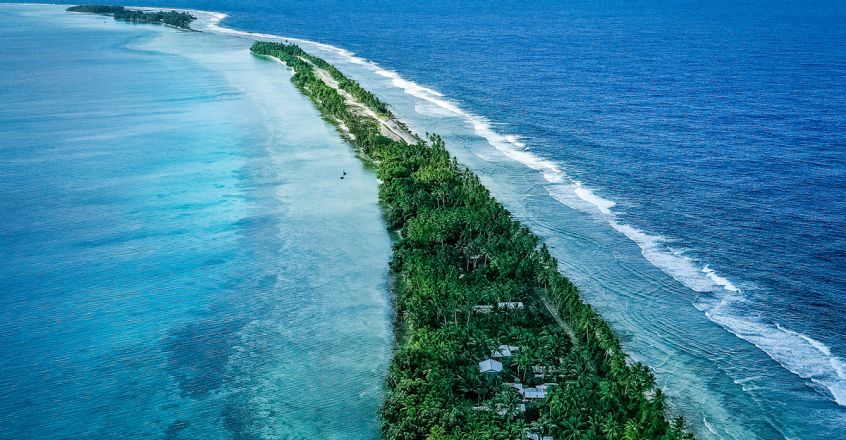Note: This is the second part of the two-article series on the dangers faced by Tuvalu. It is unfortunate that Asia’s tiny islands are hardly part of global discussions on climate change. It shall be our endeavor to sensitize our readership about all developments in Asia irrespective of their significance in the global media narratives. We will ensure that even Asia’s micro-minorities must receive the coverage they deserve.
The Importance of Tuvalu
“They were the home of our ancestors, they are the home of our people today and we want them to remain the home of our people into the future,” – Simon Kofe, Tuvalu’s foreign minister.
Healthy oceans are not only a source of jobs, but regulate the climate, sustain economic growth, and support the welfare of costal societies, many of which are some of the poorest in the world. Nevertheless, the ocean and its resources are far too often brought to the brink by human activities despite their wealth and importance. Over fishing, the destruction of vital coral reefs, pollution, and rising water temperatures are just some of the harmful factors speeding up the destruction of our oceans and Tuvalu is one of the first places where the consequences are felt.
During the thousands of years that the Polynesian people have inhabited Tuvalu, they have been able to overcome the many climatic threats that occur such as droughts and cyclones. However, as Tuvaluans are now faced with the unprecedented, human-induced threat of climate change, they are unable to cope with the frequency and magnitude of extreme weather events coupled with the increasing speed of the deterioration of their country. As Tuvalu is a nation that could potentially be considered as the most fisher-dependent nation on earth with its main export being fish, the threat of rising sea levels and temperatures means that countries like Tuvalu are facing the brunt of the climate crisis as it is affecting one of the only sources of income of its residents. With the wet season from October to March generating tropical storms which inflict extensive damage on local infrastructure and food sources, followed by the dry season in June to September characterized by droughts, Tuvalu has little to no room for further issues caused by climate change. The small nation is frequently battered by waves from the east and the west, “swallowing” the country, in the words of the locals. Moreover, resource scarcity is one of the largest issues facing Tuvalu as their diet is primarily based around the marine environment along with a limited amount of food crops that are able to grow. Additionally, with the supply of fresh water already so scarce, the increased frequency and intensity of droughts coupled with the decrease in rainfall means that Tuvalu and its citizens are facing a shortage of vital fresh water. “Record low rainfall levels leave our drinking water tanks empty and our crops withered. Climate extremes are hitting our country hard. Our communities rely on rainfall as the main source of fresh water as there are no rivers on the island” states Tagifoe Taomia, the Secretary General of the Tuvalu Red Cross. So, the consequences of climate change all have a severe and permanent effect on the lives of Tuvaluans.
Not only does climate change have an adverse impact on economy, but also on the health of the population, something that is often overlooked or forgotten. Climate-related illnesses are an important factor which has to garner more attention, as human health has always been influenced by the climate. There are two main ways that climate change affects human health: first, by changing the frequency or severity of health problems that is already affected by the weather or climate; and second, by creating new health threats in places where they have not previously occurred. In the case of Tuvalu, the severe and permanent damage done to the ocean’s natural resources means that the primary source of protein, fish, is diminishing at a rate that is unsustainable as well as the salinization of the soil and ground water. Moreover, Tuvalu is encountering a prevalence of water-borne diseases such as dengue are increasing due to their sensitivity to the warming and flooding of water. Furthermore, the health risks are intensified by the insufficient health care facilities all accumulating in a bleak outlook.
Conclusion
In the dramatic words of the former assistant secretary at Tuvalu’s Ministry of Natural Resources, Energy and Environment, Paani Laupepa, “”We don’t want to leave this place. We don’t want to leave, it’s our land, our God given land, it is our culture, we can’t leave. People won’t leave until the very last minute.” This sentiment of urgency and stress is echoed throughout all the citizens of the tiny island nation, and rightly so. Climate change is affecting Tuvalu at a rate that almost every other country cannot relate to, and will be the first to collapse and ultimately vanish. The Asia Pacific region will continue to bear the brunt of the extreme impact of climate change unless timely and most importantly effective action is done. Every year, Tuvalu and its island neighbors suffer from increasingly intensifying costal and weather events of different magnitudes. Although the island nations have taken bold steps to cut their greenhouse gases and increase their resilience to climate impacts since the Paris Agreement in 2015, but due to their small size and nature, their actions may not effectively have an impact unless the larger polluters such as the US or China follow in their green steps to address the environmental crisis. Despite international steps towards reducing the effects of climate change such as the Kyoto Protocol and Paris Agreement, the rate at which countries are implementing counter measures are too slow and inefficient as Tuvalu is already experiencing adverse changes. Solutions will have to be created without delay to avoid irreversible catastrophe.

